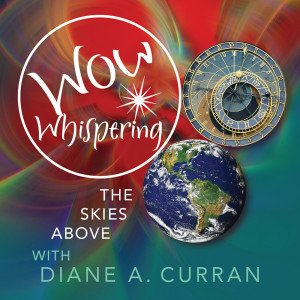Episodes

Monday Apr 22, 2019
24: No Dark Matter & Earth Day . The Skies Above with Diane A. Curran
Monday Apr 22, 2019
Monday Apr 22, 2019
In this episode, we celebrate the announcement of a new galactic discovery on Earth Day 2019.
A Wow! confirmed...
"We thought that every galaxy had dark matter and that dark matter is how a galaxy begins," said Pieter van Dokkum of Yale University in New Haven, Connecticut, lead researcher of the Hubble observations. "This invisible, mysterious substance is the most dominant aspect of any galaxy. So finding a galaxy without it is unexpected. It challenges the standard ideas of how we think galaxies work, and it shows that dark matter is real: it has its own separate existence apart from other components of galaxies. This result also suggests that there may be more than one way to form a galaxy.”
Finding one such galaxy, known as “NGC 1052-DF2” is quite amazing. Yet today, the news is peppered with confirmations that a second such galaxy
“DF4” has now been sufficiently studied to credibly deem it to have no dark matter, too.
How might this matter to us here on Earth, as we celebrate the 50th Earth Day across the planet? We're here to chat and consider more than just one day's concerns.
New reports of interest:
NASA Dark Matter Goes Missing in Oddball Galaxy
EarthSky Astronomers find 2nd galaxy lacking dark matter
Wired Two Unusual Galaxies Shake Up The Dark Matter Debate, Again
Business Insider Astronomers just found a 2nd galaxy containing no dark matter — and it may change everything we knew about how galaxies are formed.
About this series:
Humanity has always turned its gaze upward, and as our technology gets exponentially more sophisticated, we are still mesmerized by the The Skies Above. Our attention spans mythology to modern times, and space travel, both physical and virtual in the here and now; at once rich in symbolism, while teeming with yet undiscovered scientific data that beckons us onward.
Your Wow Whispering host Diane has been fascinated since childhood with all things skyward, as we expand our podcast series to The Skies Above.
In this series we honor two traditions which were originally united as one: Astrology and Astronomy. Both derive purpose from seeking to understand the nature of life through explorations beyond Earth. From symbolism to science, mythology to modernity, humanity wants to know more, ever more, about our place in the cosmos.
Our Websites:
Social Media link
Twitter: @wowdianeacurran
. . . . . . . . . . . . . . . . .
Our Podcast PSA for this episode highlights two organizations.
NCGR
Visit them online:
The National Council for Geocosmic Research, Inc., (NCGR) is a non-profit organization dedicated to raising the standards of astrological education and research.
Along with its U.S. membership it includes a growing number of international members and sponsors 30+ local Chapters in 20 U.S. states and 4 countries. Its Special Interest Groups (SIGs) foster dialog on various astrological specialties and its online education and educational conference bring astrologers from around the world together to grow and to learn together. Their sister organization, NCGR-PAA, allows students to leverage their astrological education into professional certification, and they welcome new members.
• • •
NASA, the National Aeronautics and Space Administration
https://www.nasa.gov/about/whats_next.html
NASA's vision: We reach for new heights and reveal the unknown for the benefit of humankind.
Next For NASA?
Thousands of people have been working around the world -- and off of it -- for decades, trying to answer some basic questions. What's out there? How do we get there? What will we find? What can we learn there, or learn just by trying to get there, that will make life better here on Earth?
Solar System and Beyond
NASA will add to its existing robotic fleet at the Red Planet with the InSight Mars lander set to study the planet’s interior. The Mars 2020 rover will look for signs of past microbial life, gather samples for future return to Earth and investigate resources that could someday support astronauts.
Sending Humans Out into Solar System: Moon to Mars
International Space Station
And even more to come in the areas of Flight, Space tech and Earth studies!


No comments yet. Be the first to say something!